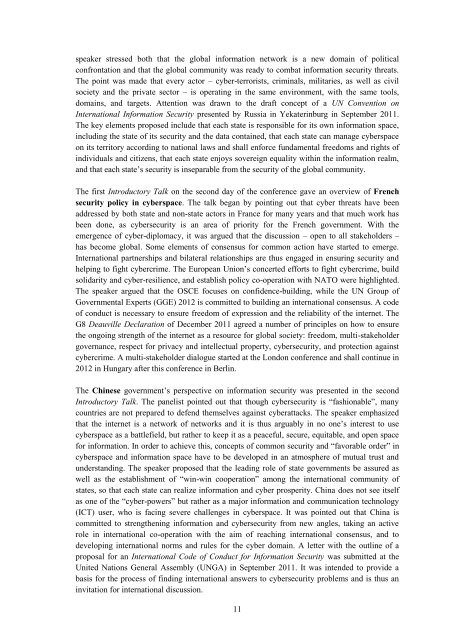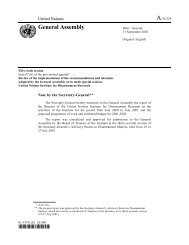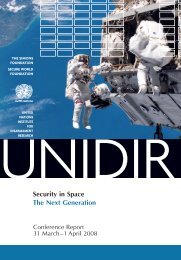Challenges in Cybersecurity Risks, Strategies, and ... - Unidir
Challenges in Cybersecurity Risks, Strategies, and ... - Unidir
Challenges in Cybersecurity Risks, Strategies, and ... - Unidir
You also want an ePaper? Increase the reach of your titles
YUMPU automatically turns print PDFs into web optimized ePapers that Google loves.
speaker stressed both that the global <strong>in</strong>formation network is a new doma<strong>in</strong> of political<br />
confrontation <strong>and</strong> that the global community was ready to combat <strong>in</strong>formation security threats.<br />
The po<strong>in</strong>t was made that every actor – cyber-terrorists, crim<strong>in</strong>als, militaries, as well as civil<br />
society <strong>and</strong> the private sector – is operat<strong>in</strong>g <strong>in</strong> the same environment, with the same tools,<br />
doma<strong>in</strong>s, <strong>and</strong> targets. Attention was drawn to the draft concept of a UN Convention on<br />
International Information Security presented by Russia <strong>in</strong> Yekater<strong>in</strong>burg <strong>in</strong> September 2011.<br />
The key elements proposed <strong>in</strong>clude that each state is responsible for its own <strong>in</strong>formation space,<br />
<strong>in</strong>clud<strong>in</strong>g the state of its security <strong>and</strong> the data conta<strong>in</strong>ed, that each state can manage cyberspace<br />
on its territory accord<strong>in</strong>g to national laws <strong>and</strong> shall enforce fundamental freedoms <strong>and</strong> rights of<br />
<strong>in</strong>dividuals <strong>and</strong> citizens, that each state enjoys sovereign equality with<strong>in</strong> the <strong>in</strong>formation realm,<br />
<strong>and</strong> that each state’s security is <strong>in</strong>separable from the security of the global community.<br />
The first Introductory Talk on the second day of the conference gave an overview of French<br />
security policy <strong>in</strong> cyberspace. The talk began by po<strong>in</strong>t<strong>in</strong>g out that cyber threats have been<br />
addressed by both state <strong>and</strong> non-state actors <strong>in</strong> France for many years <strong>and</strong> that much work has<br />
been done, as cybersecurity is an area of priority for the French government. With the<br />
emergence of cyber-diplomacy, it was argued that the discussion – open to all stakeholders –<br />
has become global. Some elements of consensus for common action have started to emerge.<br />
International partnerships <strong>and</strong> bilateral relationships are thus engaged <strong>in</strong> ensur<strong>in</strong>g security <strong>and</strong><br />
help<strong>in</strong>g to fight cybercrime. The European Union’s concerted efforts to fight cybercrime, build<br />
solidarity <strong>and</strong> cyber-resilience, <strong>and</strong> establish policy co-operation with NATO were highlighted.<br />
The speaker argued that the OSCE focuses on confidence-build<strong>in</strong>g, while the UN Group of<br />
Governmental Experts (GGE) 2012 is committed to build<strong>in</strong>g an <strong>in</strong>ternational consensus. A code<br />
of conduct is necessary to ensure freedom of expression <strong>and</strong> the reliability of the <strong>in</strong>ternet. The<br />
G8 Deauville Declaration of December 2011 agreed a number of pr<strong>in</strong>ciples on how to ensure<br />
the ongo<strong>in</strong>g strength of the <strong>in</strong>ternet as a resource for global society: freedom, multi-stakeholder<br />
governance, respect for privacy <strong>and</strong> <strong>in</strong>tellectual property, cybersecurity, <strong>and</strong> protection aga<strong>in</strong>st<br />
cybercrime. A multi-stakeholder dialogue started at the London conference <strong>and</strong> shall cont<strong>in</strong>ue <strong>in</strong><br />
2012 <strong>in</strong> Hungary after this conference <strong>in</strong> Berl<strong>in</strong>.<br />
The Ch<strong>in</strong>ese government’s perspective on <strong>in</strong>formation security was presented <strong>in</strong> the second<br />
Introductory Talk. The panelist po<strong>in</strong>ted out that though cybersecurity is “fashionable”, many<br />
countries are not prepared to defend themselves aga<strong>in</strong>st cyberattacks. The speaker emphasized<br />
that the <strong>in</strong>ternet is a network of networks <strong>and</strong> it is thus arguably <strong>in</strong> no one’s <strong>in</strong>terest to use<br />
cyberspace as a battlefield, but rather to keep it as a peaceful, secure, equitable, <strong>and</strong> open space<br />
for <strong>in</strong>formation. In order to achieve this, concepts of common security <strong>and</strong> “favorable order” <strong>in</strong><br />
cyberspace <strong>and</strong> <strong>in</strong>formation space have to be developed <strong>in</strong> an atmosphere of mutual trust <strong>and</strong><br />
underst<strong>and</strong><strong>in</strong>g. The speaker proposed that the lead<strong>in</strong>g role of state governments be assured as<br />
well as the establishment of “w<strong>in</strong>-w<strong>in</strong> cooperation” among the <strong>in</strong>ternational community of<br />
states, so that each state can realize <strong>in</strong>formation <strong>and</strong> cyber prosperity. Ch<strong>in</strong>a does not see itself<br />
as one of the “cyber-powers” but rather as a major <strong>in</strong>formation <strong>and</strong> communication technology<br />
(ICT) user, who is fac<strong>in</strong>g severe challenges <strong>in</strong> cyberspace. It was po<strong>in</strong>ted out that Ch<strong>in</strong>a is<br />
committed to strengthen<strong>in</strong>g <strong>in</strong>formation <strong>and</strong> cybersecurity from new angles, tak<strong>in</strong>g an active<br />
role <strong>in</strong> <strong>in</strong>ternational co-operation with the aim of reach<strong>in</strong>g <strong>in</strong>ternational consensus, <strong>and</strong> to<br />
develop<strong>in</strong>g <strong>in</strong>ternational norms <strong>and</strong> rules for the cyber doma<strong>in</strong>. A letter with the outl<strong>in</strong>e of a<br />
proposal for an International Code of Conduct for Information Security was submitted at the<br />
United Nations General Assembly (UNGA) <strong>in</strong> September 2011. It was <strong>in</strong>tended to provide a<br />
basis for the process of f<strong>in</strong>d<strong>in</strong>g <strong>in</strong>ternational answers to cybersecurity problems <strong>and</strong> is thus an<br />
<strong>in</strong>vitation for <strong>in</strong>ternational discussion.<br />
11








